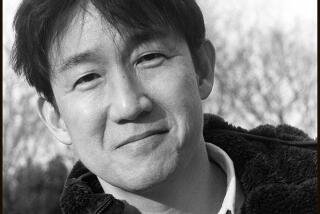BOOK REVIEW : Paradoxes and Conflicts on the Pacific Rim : SAME BED, DIFFERENT DREAMS <i> by Hugh Gross</i> ; Mid-List Press, $17.95, 223 pages
- Share via
The engaging title of this award-winning first novel dramatizes the proverbial Japanese phrase: “Even those who share the same bed will have different dreams.”
Struck by the paradoxes and conflicts in modern Japanese society during his sojourns in that country, Hugh Gross explores these tensions in a terse and ironic chronicle of contemporary family and professional life.
Toshio, the decidedly unheroic protagonist, is a rarity in an economy dominated by mega-corporations--an advertising man in business for himself. He is proud of his independence but envious of his brother Kazuo’s security in the hierarchy of a large company.
Like many fictional advertising men, Toshio is continually compromising his early ideals, helplessly watching his fragile values deteriorate as he scrambles for accounts in an increasingly competitive business. Married to his high-school sweetheart, Nozomi, and father of an adolescent son and daughter, beleaguered by clients and tempted by winsome and submissive “office ladies,” Toshio is clearly struggling with a mid-life crisis, a condition that has become virtually endemic among his generation, though it has not yet acquired a Japanese name.
Born into the postwar work ethic, brought up in a traditional family, Toshio is trapped between his desire for material success and his longing for the relatively liberated lives of his junior colleagues. So far, he’s managed to straddle both worlds, but the strain is obvious. His dutiful wife is showing signs of restlessness, wondering what sort of future she’ll have once the children leave home, and beginning to resent the narrowness and isolation of her life.
Left behind while Toshio disports himself with clients and employees in the bars and restaurants of Tokyo, Nozomi indulges in fantasies of her own--dreams that don’t include nursing Toshio’s colossal hangovers and tolerating his unpredictable temper. Though she takes a tentative first step towards independence by signing up for English lessons, she’s even more the prisoner of her upbringing than Toshio and far less able to change matters.
“Same Bed, Different Dreams” offers a fresh take on the rapidly rising stack of Pacific Rim literature. Here the author is a particularly qualified and perceptive observer of the process by which a vastly different society struggles to maintain its unique distinction while simultaneously adapting to imported ways.
The sole American in the novel, a genial Yank eager to ally his advertising agency with Toshio’s thriving company, offers the author a chance to explore the adjustments involved in such an association--the difference between a society of rugged individualists and one in which the group is paramount.
Though the image of Japanese industry presented to American readers is still that of enthusiastic collective effort for the common good, that ethic is gradually being eroded by alien influences, just as the conventional role of the subservient wife is rapidly becoming less satisfactory to those obliged to play it.
These questions bubble and simmer just beneath the surface of this novel, enlivening what might otherwise be a replay of a familiar refrain.
Next: Carolyn See reviews “Domestic Pleasures” by Beth Gutcheon (Villard).
More to Read
Sign up for our Book Club newsletter
Get the latest news, events and more from the Los Angeles Times Book Club, and help us get L.A. reading and talking.
You may occasionally receive promotional content from the Los Angeles Times.







